For nearly 50 years, Mary Walsh has helped carve out Newfoundland’s place on Canada’s cultural map. Now, at 67, she remains every bit the Princess Warrior, embracing aging, shattering barriers and explaining just what makes people from the Rock so darn funny.
Mary Walsh has a theory about why Newfoundlanders are so funny. It starts with the fact that only around 500,000 people live on the Rock — “a genetic pool the size of a pudding bowl,” she laughs, quoting local satirist Ray Guy. “So I always think that the first two who came were really funny, and it just went on from there.”
And while Ontario often considers itself Canada’s funny bone — exports include Catherine O’Hara, Eugene Levy, Martin Short and John Candy among others — the St. John’s native notes, “It’s not held aloft as something you might want to be: funny. Whereas here, you know, ‘Not much of a fisherman, but f**king funny.’”
The 67-year-old offers, as an example of the island’s unique wit, a true story about a musician who played a gig in St. Anthony and needed to hire someone to take the gate. When he called the phone number provided, his mother answered and shouted, “Ankles, you’re wanted on the phone.” Later, when the musician asked how the man got his nickname, he discovered that the man had tried to hang himself from the chimney, but the rope was too long so he only managed to break his ankles.
“When you tell that story to people, it sounds cruel, but it just kills Newfoundlanders,” Walsh howls. “Even his mother called him Ankles. So I think that Newfoundland’s sense of humour, like many people in the world, is dark.”
She can’t explain exactly why that is but says comedy is currency on the Rock. “And music. Because I guess we’re an isolated island in the middle of the North Atlantic. We like a laugh and an accordion.”
Walsh is what Newfoundlanders call “best kind,” evidenced by a nearly 50-year career that has earned her the Order of Canada (2000), the Governor General’s Performing Arts Lifetime Artistic Achievement Award (2012) and the Canadian Screen Awards Earle Grey Award, one of the Academy’s highest honours (2019). And she’ll keep you on your toes. One minute she’s explaining how locals have “quite good arses and legs” from climbing the precipitous city streets and the next she’ll drop a line from a 19th-century Sir Walter Scott poem.

St. John’s residents beam with pride when they talk about her, though she’s treated less as a celebrity and more like a revered neighbour. One afternoon, as she’s posing for a photo in the doorway of an indigo-blue house wearing a polka-dot coat, a man inside opens the door to investigate. Walsh, naturally, apologizes for the intrusion. “Not to worry,” he smiles, “I just wanted to see if you’re staying for dinner.”
Walsh is also often equated with her most famous character, Marg Delahunty — a.k.a. Marg, Princess Warrior, the bespectacled, gladiatorial This Hour Has 22 Minutes correspondent — whose boldness, no-B.S. attitude and woman-of-the-people aura she embodies.
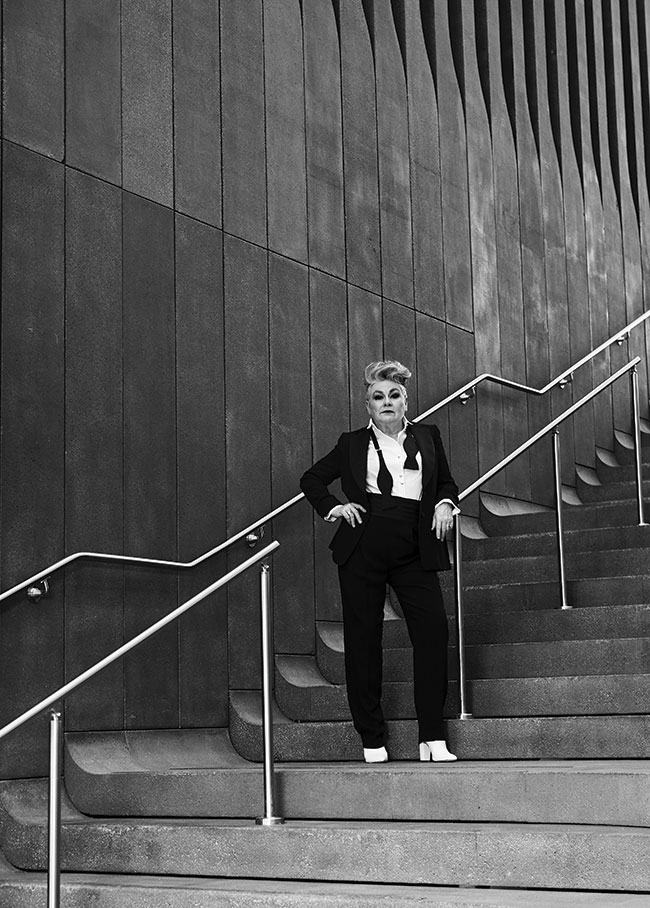
Friend and St. John’s-born filmmaker Roger Maunder calls her “the fighting Newfoundlander,” while Alana Walsh-Giovannini, co-founder of the ovarian cancer charity Belles with Balls NL, says, “She makes it easy for us to laugh at ourselves but not to make fun of ourselves … If anything, she’s raised up the perception of Newfoundlanders.”
The charity leader beams from the sidelines as Maunder films Walsh. It’s for a public service announcement at Memorial University’s Signal Hill campus for the St. John’s Lady Ball she’ll host in May in support of ovarian cancer research. Decked out in a red suit and fuchsia shirt, which pop against the snowy St. John’s Harbour in the window behind her, Walsh rhymes off the script with an ease of delivery and comedic timing that delights gathered onlookers.
“She’s been through some difficult and challenging times, as most of us have, but again, perseverance, strength and humour,” Walsh-Giovannini adds. “It’s a Lady Ball, and we figure she had the biggest lady balls that we know.”
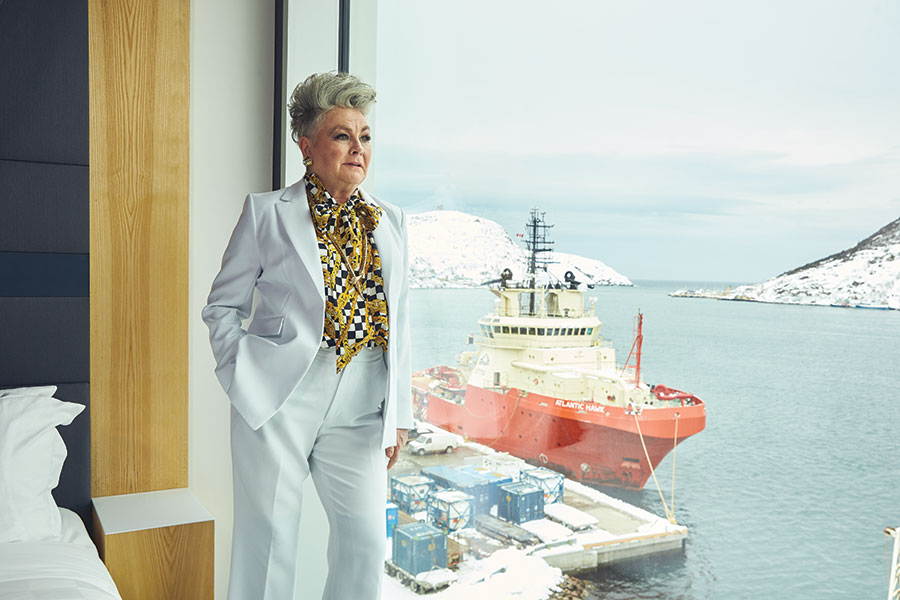
Mary Walsh: Born Warrior
Walsh has been a warrior since birth, landing in the hospital with pneumonia at eight months before being sent by her parents to live with two aunts and an uncle in their supposedly warmer and drier house next door. “I guess they just forgot and kind of left me there,” she laughs, noting she never returned to live at her parents’ home.
She recalls being there, though, a few years later when her six-year-old brother, Greg, threw a bedtime tantrum, putting his fist through a door with the battle cry, “I’m not backing down tonight!” Walsh says it became something of a family motto: “I completely accepted it, that you should never back down.”
And that’s where Mary Walsh and Marg Delahunty intersect. Marg leads by the fists — one clutching a microphone, the other a plastic sword — and verbally pummels the powerful for sport. Members of government are preferred prey, and she cuts to the core of their political essence in the space of a punchline. “If ignorance is bliss, Mr. Martin, then you must always be in seventh heaven,” she once told former Prime Minister Paul Martin. She also planted a smooch on then-prime ministerial hopeful Stephen Harper, declaring, “Not bad, a little cold. Sort of like kissing a stick, really.” She famously sent the late Toronto Mayor Rob Ford scurrying from a driveway encounter back into his house to call 911 and, last year, nabbed Conservative Party leader Andrew Scheer ahead of the federal election. “Isn’t it a wonderful time for you to become PM, when all of the racist right-wing nuts have all gone over to Maxime Bernier, and all you’ve got left are the quiet racist right-wing nuts?”
“Mary is excellent at being incredibly bold,” fellow St. John’s native and 22 Minutes comedy partner Cathy Jones says on the phone from Halifax. “I would feel like, ‘No, that’s rude. I shouldn’t really go over to that guy.’ And she was like, ‘F**k it!’”
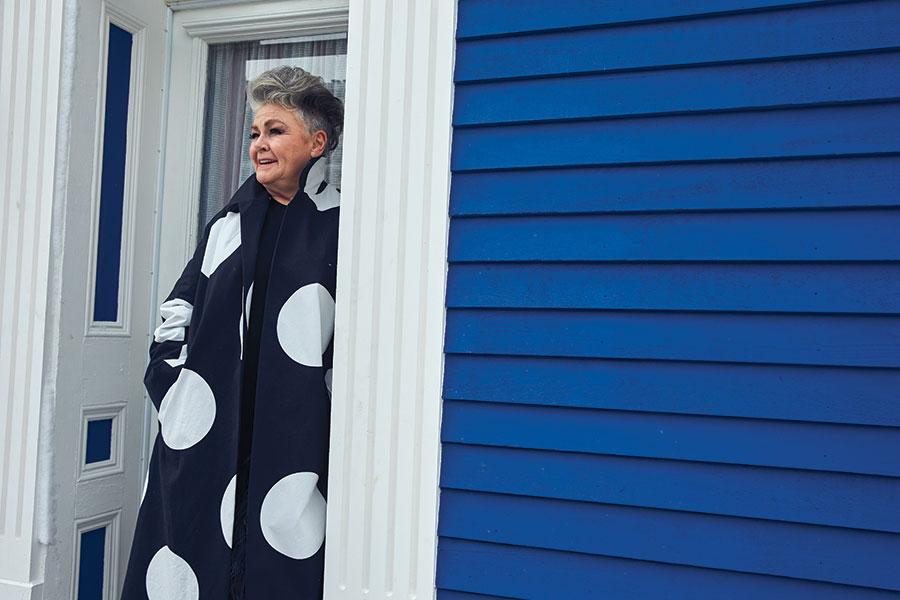
Comedian Rick Mercer, another hometown pal and 22 Minutes alum who went on to host the Rick Mercer Report, says Walsh would never call herself fearless, “but you could certainly convince a jury that she was fearless … and that really resonates with people because I think people often think, ‘I wish I had the courage to say that to that person’s face.’”
Walsh wonders instead if it’s bravery or stupidity. She notes she’s often too impulsive to consider the consequences, “and so it’s later, while I’m waiting to ambush the prime minister or something, and I’ve got that stupid costume on … I’m so full of shame that I just think, ‘Shag it. I might as well just go ahead and do it. What have I got to lose now?’”
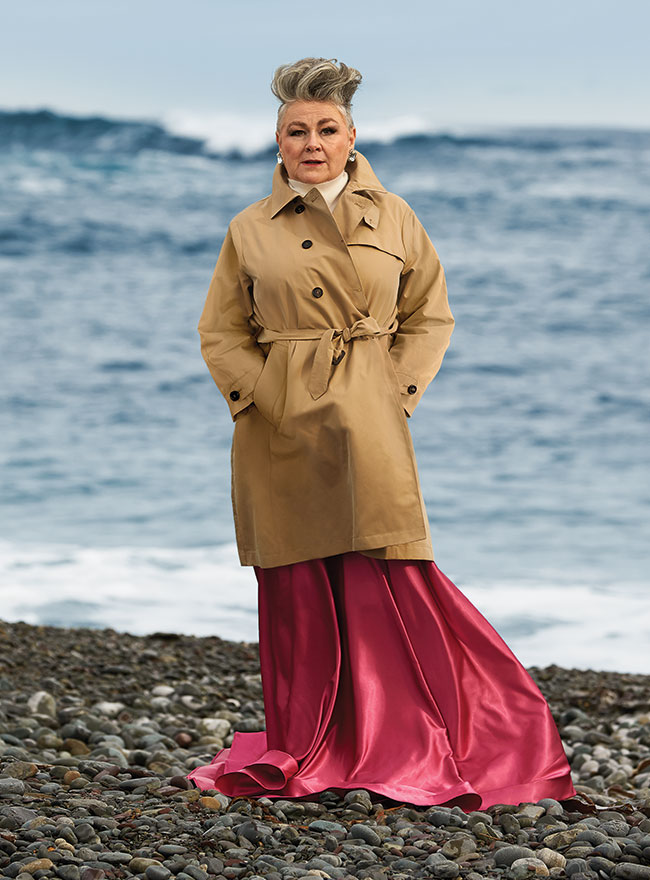
Finding Comedy, and Community, in Newfoundland
Walsh sowed the seeds of her comedy career in Toronto in the early 1970s. While studying theatre at Ryerson , she and fellow Newfoundlanders Jones, Tommy Sexton, Dyan Olsen, Greg Malone and Paul Sametz founded their groundbreaking CODCO sketch comedy troupe. They returned home to tour the play Cod on a Stick, which poked fun at Newfoundland stereotypes. In 1988, they launched the CODCO sketch show on CBC, satirizing social issues through their unique and sometimes self-deprecating Newfoundland lens.
Mercer says the troupe paved the way for young local entertainers. “When you wanted to work in TV, it didn’t seem like a completely insane notion because there were people doing it, and they were doing it down the street.”
But Walsh had bigger ambitions. In 1979, she and her pals took control of the city’s LSPU Hall, a former longshoreman’s meeting place, converting it into an artist-run theatre, in an effort to make St. John’s an artistic capital of Canada.
“We were really rotted that nobody else thought we were worth anything,” she explains. “We went from being Britain’s doormat to being Canada’s laughingstock because we didn’t join [Confederation] till ’49, and people just pissed their pants laughing at goofy Newfies for years … I think we believed it was [the capital] and that it just needed to be recognized in some way.”
Today Mercer calls LSPU Hall “essentially the national theatre of Newfoundland.” It’s an even more remarkable achievement given Mercer almost burned it to the ground as a teen when he stuck a lit cigarette in a pipe there.
“Flames burst out of the pipe,” he recalls, while Walsh, furious that he could have burned down the 200-year-old wooden building, put it out with her coffee. “And she was like, ‘Oh God, now I have to get another coffee.’ And she left.”
All was forgiven by 1993, when Walsh, at 41, broke new ground by launching the celebrated satirical news program This Hour Has 22 Minutes, which gave Mercer his big television break. The series predated similar news-format-as-comedy franchises like The Daily Show — which made a star out of another Ontario-born comic, Samantha Bee — and introduced the world to Marg Delahunty and other beloved characters. Today, Walsh makes sporadic appearances on the show, but it remained grounded in its Newfoundland comedy tradition as it powered through its 27th season.
Save for her stint at Ryerson, Walsh has never left St. John’s. She lives in a yellow, two-storey home near downtown, her broken doorbell taped over with a piece of paper bearing her cellphone number for visitors to call when they arrive. The inside feels more like a cottage than a house, with a rustic warmth, wood-beam ceilings and clusters of framed photos adorning tabletops throughout the living room. In her office, shelves contain books and some old VHS tapes in black cases, while a selection of photographs from her wedding hang on the wall by the stairs.
At 50, she married Don Nichol, a Memorial University English professor, on a boat in Freshwater Bay where they had the reception before returning to the harbour. “And two whales came back in with us,” she adds, though it’s unclear if that counts for good luck in Newfoundland.
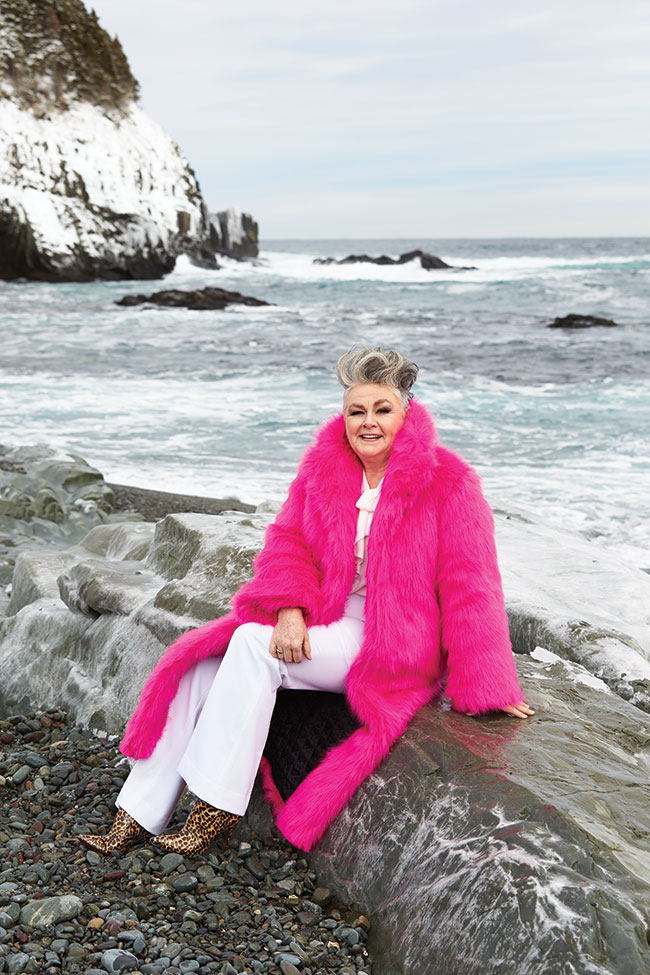
The island has been a reliable constant in Walsh’s life, even as she struggled with mental health issues and battled alcoholism that began around age 15 and ended at 39 when she got sober. She recalls getting drunk and crawling under the table to bite people’s ankles. “When you’re 26 and you’re biting guys on the ankles, it’s kind of cute. When you’re 38, it gets to be less and less cute.”
Walsh stopped drinking for her son Jesse, who was three at the time. “There’s not many things that I regret,” she says, but does wish she had found sobriety sooner. Shortly after, she launched 22 Minutes.
Humour has helped her cope with pain, for which she’s grateful. In adulthood, for example, some of her siblings moved to Alberta for work, and her mother followed. Walsh didn’t find out her mom had moved, though, until an aunt told her months later. Then, in 2007, her sister Madonna died. But when her family brought her ashes back to Newfoundland to scatter them, they again neglected to tell Walsh. She recalls her brother Greg’s response when he found out she was upset about being left out. “He went, ‘Jesus Christ, when is she gonna get it? We gave her away when she was eight months old, we all moved out to Alberta that time and we never told her. What, are we going to have to write her a f**king book?’”
Walsh laughs telling the story that often draws sad looks from non-Newfoundlanders. “To me, that was a big issue in my life that had never been brought up. Nobody ever talked about it. And I was afraid to ask about it, and here’s my brother making a joke about it, which made it all seem just normal. It’s just using humour in that way.”
But the laughs fell flat in her 2005 pilot for Hatching, Matching and Dispatching — a comedy about a family that runs an ambulance, wedding and funeral business, now available on Amazon Prime. She received blowback from Newfoundlanders who felt it mocked them, which prompted the realization of just how much her homeland meant to her.
“It just struck me that Newfoundland has given me everything. My life, my career, everything I know, everything I am came from here,” she says introspectively. “And I didn’t really have my family when I was growing up, so Newfoundland has been my family … It’s an extra added little gift we get that we feel that kind of sense of home.”
It’s one of the reasons Walsh spends so much time giving back to the community, working with charities related to addiction and mental health, among others, and local causes. Inspired by residents who helped dig out neighbours during January’s “snowpocalypse” but unable to shovel after two back surgeries, she donated food to those in need and volunteered at the Froude Avenue Community Centre.
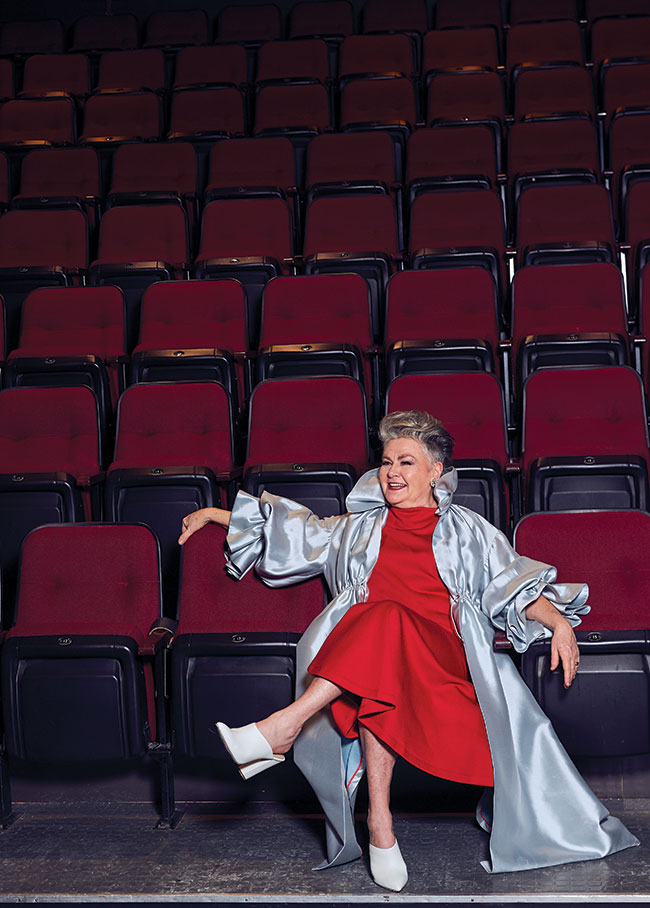
Lorraine Power, Walsh’s hairstylist and long-time friend, says the comedian’s charitable pursuits are an example of “the softness in her,” which the Princess Warrior exterior doesn’t always convey. “It’s a Newfoundland thing. We’re all helpers. She has a heart as big as all outdoors.”
Walsh, however, still wonders if it proved “more useful to stay here, or would it have been more useful to go to New York and get a Hollywood career and then use that to be more effective?” Regardless, she believes that “whatever you can do, you have to do because we struggle so mightily and … because you always get so much more out of everything that you do than you ever give.”
The Rise of “Wrinkled Radicals”
Walsh sits at the table in a downtown St. John’s café, cappuccino in hand, quietly singing to herself as Chuck Berry’s “You Never Can Tell” plays overhead.
“C’est la vie,” say the old folks, it goes to show you never can tell …
The song conjures memories of the scene in Quentin Tarantino’s Pulp Fiction, where Uma Thurman and John Travolta famously win a dance contest to the tune. Like Thurman, Walsh personifies cool with her white shirt and iconic hairdo — a grey pompadour rather than a black bob with bangs — and looks the part of a badass Tarantino character who’s set to slice and dice foes with her razor-sharp wit. She’s even got her own catchphrase — “wrinkled radicals” — the term she uses to describe older women who shatter the expectations of aging. “Surely we who spent our youth burning our bras, promoting free love and [were] out to do nothing less than totally changing the world for the better won’t just settle for withering away quietly,” she said during a speech at Toronto’s 2019 ideacity conference (a ZoomerMedia property).
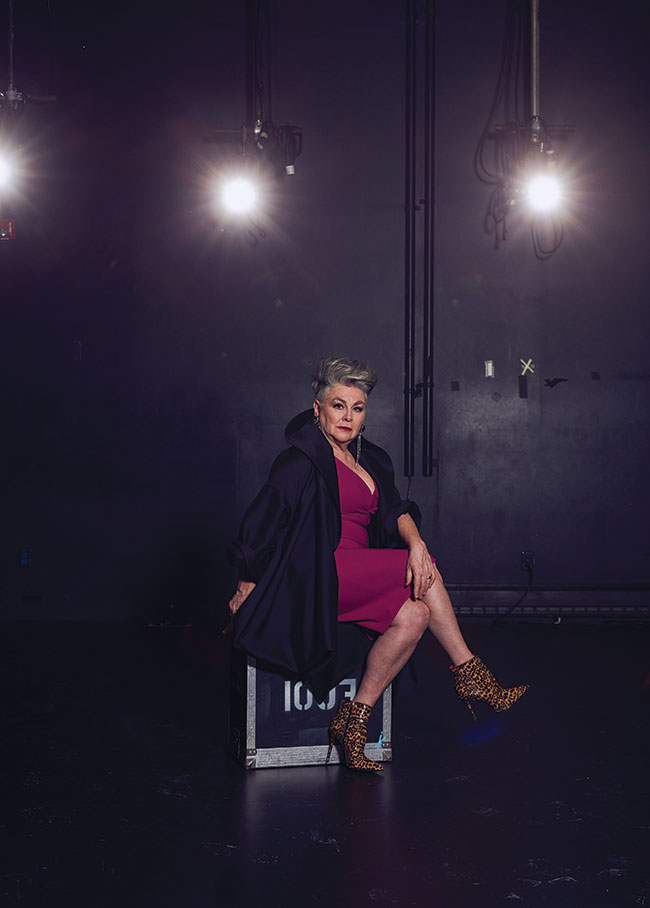
She points to influences like Jane Fonda, a lifelong activist who’s still proudly getting arrested at climate change rallies at age 82. “I feel like, well, what do I have to lose?”
In some ways, Walsh has always championed wrinkled radicals. She’s played older women since at least her 30s, during her CODCO days, because she grew up around them, and “as an old woman … you can say things, you can be things, you’re not just trying to be the object of somebody else’s desire. You can be the subject of your own life, even if you’re only 18 but you’re playing 60.”
And now that she’s in her 60s, she’s spreading the word about the happiness this stage of life brings and how it affords the time to “come to some understanding of yourself and some acceptance of yourself.” And, of course, she allowed her red hair to grey into her exquisite pompadour.
“It just gives her a look, a power and majesty almost,” says Power, who created the look. “She’s not afraid of her age.”
Now, Walsh and Jones are starring as Mrs. Eulalia and Mrs. Enid, two seniors offering “pre-posthumous lifestyle advice” in the CBC digital series Broad Appeal: Living with E’s.
“It makes perfect sense that Walsh would choose something [like aging] that’s challenging, scary or even terrifying as a subject matter,” says Mercer, “and make people think about it [and] laugh about it in a different way.”
Walsh is also working on a TV comedy called Good Afternoon Klondike City — where she plays a mid-60s Toronto radio personality who gets relocated to the Yukon to host a low-rated afternoon show — and is planning a documentary about the LSPU Hall. In addition, she’s penning her second novel, Come Home Year, set in 1966 when many in the Newfoundland diaspora returned to the Rock. Her first novel, Crying for the Moon, came out in 2017.
Her most humbling endeavour, however, harkens back to one of her most public failures. In 2006, she directed a film called Young Triffie, which the Globe and Mail panned as “more to be endured than enjoyed.” So this year, Walsh applied to a director’s program at Toronto’s Canadian Film Centre, founded by Canuck filmmaker Norman Jewison in 1988. A coveted placement, the school accepts five students from 400 applicants. You’d think that someone with her service to Canadian arts and culture would expect to jump the line. But not Walsh. She questions, though, whether her age could work against her.
“Will they take me because if they invest the time and energy in somebody who’s 20, they can direct movies for 40 years? How many years do I have left? But it might be worth it. It might be really good movies I make.’”
Still, Walsh is up for the challenge. “We live 30 years longer, so what are we going to do with those 30 years?” she asks, channelling that Princess Warrior spirit. “I’m healthy and I still have a lot of energy and passion. If not now, when? If not me, who?”
And it shouldn’t come as a surprise that Walsh, after securing Newfoundland’s place on Canada’s cultural map, would set her sights on shattering new barriers, like those facing female directors from St. John’s to Tinseltown.
“If you want to know how hard it is to stay relevant for that long, you have to go to [Walsh] because she’s one of the very few people who has managed to do it,” Mercer says.
“People go quietly into the night,” he adds. Then, with a laugh, “and no one has ever accused her of that.
A version of this article appeared in the May/June 2020 issue with the headline, “There’s Something About Mary,” p. 26.
RELATED:
Podcast: Comedian Mary Walsh On Redefining How We Think About Aging
